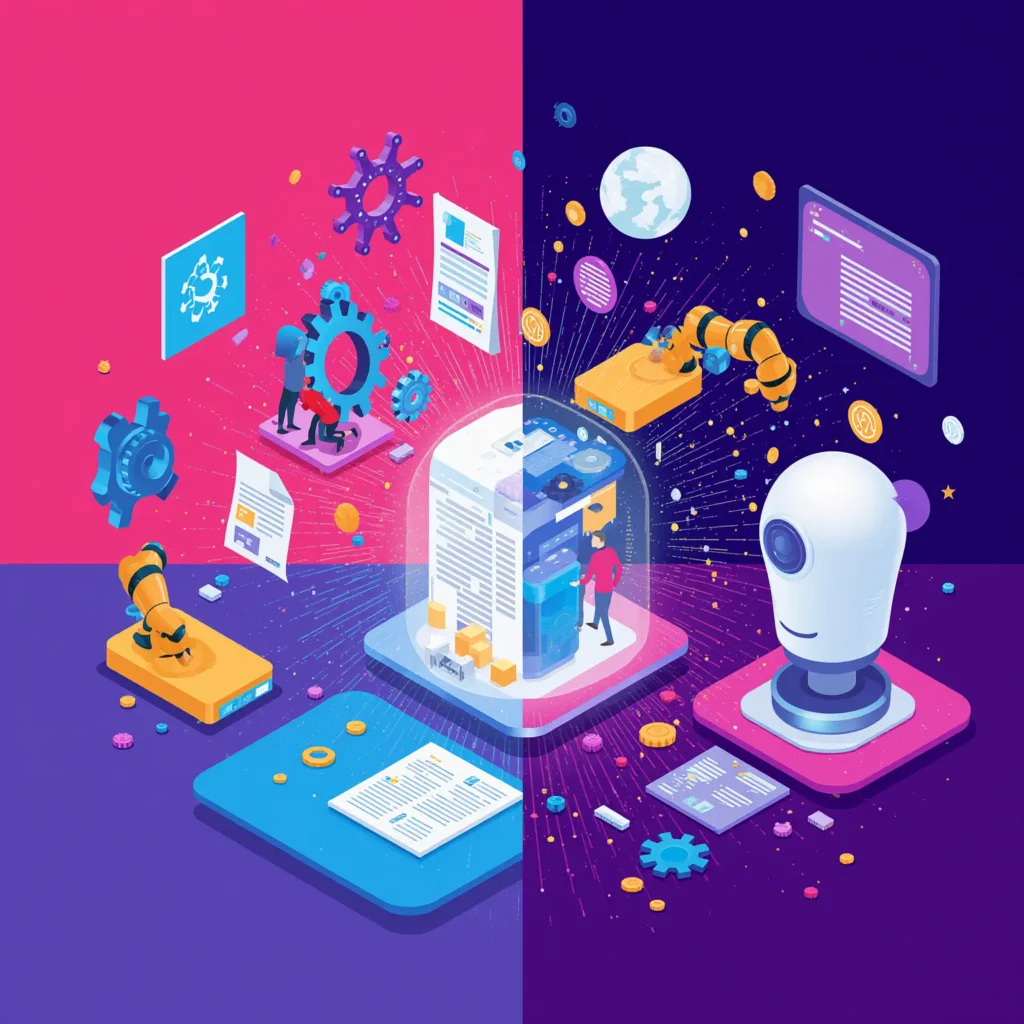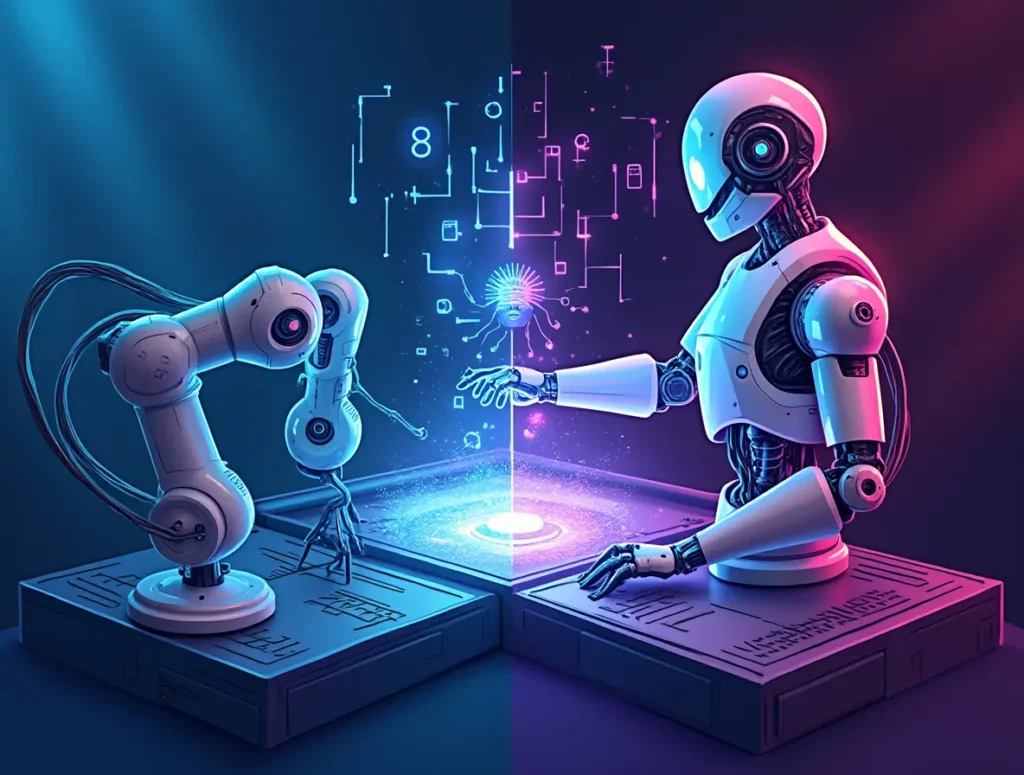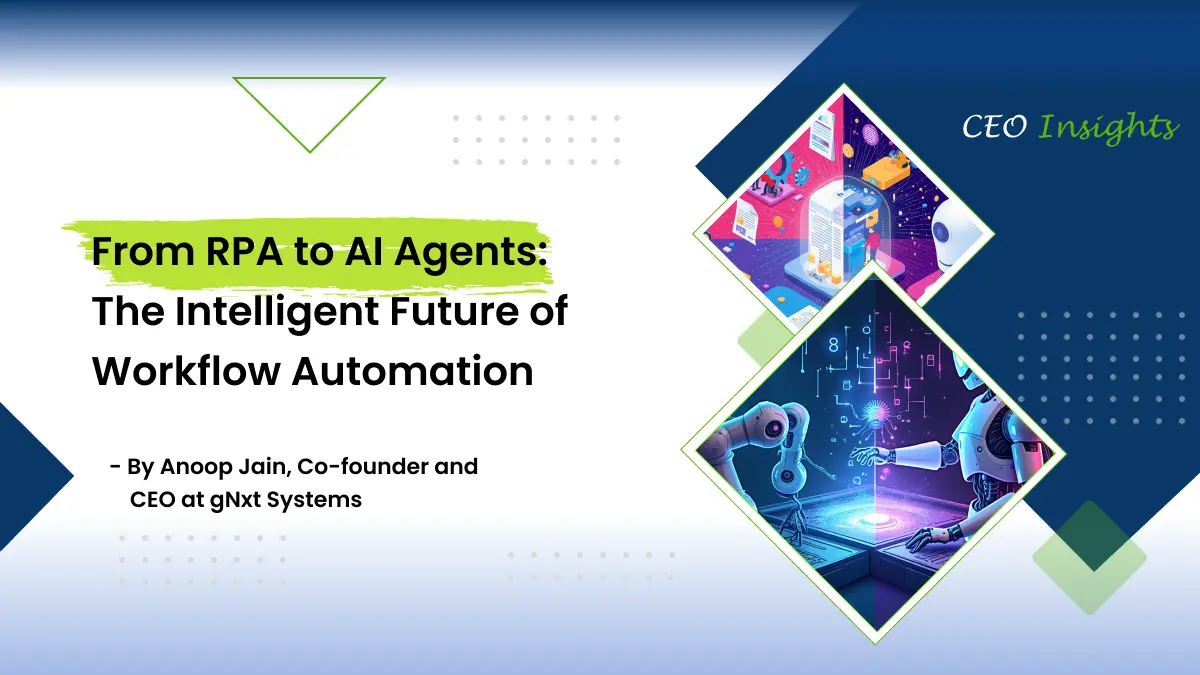- July 16, 2025
- by Anoop Jain
From RPA to AI Agents: The Intelligent Future of Workflow Automation
In today’s fast-evolving digital landscape, businesses are rapidly moving from RPA (Robotic Process Automation) to AI-powered automation—ushering in a new era of intelligent, adaptive, and scalable systems.
What began as a way to automate simple, rule-based tasks has now matured into a full-fledged ecosystem where AI agents not only execute but also understand, reason, and improve. This shift marks a significant leap forward—from “doing things faster” to “doing things smarter.”
Why the Shift from RPA to AI?

RPA workflow automation has delivered tremendous benefits over the past decade: improved efficiency, reduced costs, and standardized operations. But its reliance on structured data and predefined rules limits its effectiveness in dynamic environments.
By contrast, AI agents bring intelligence to automation. They are capable of:
Interpreting unstructured data
Learning from past decisions
Making real-time recommendations
Interacting naturally with humans and systems
This transition from RPA to AI leads to intelligent automation—a model where bots evolve from task-doers to decision-makers.
What Are AI Agents and How Do They Work?
AI agents are autonomous systems trained to understand context, make decisions, and act in dynamic environments. Unlike traditional RPA bots that follow strict rules, AI agents:
Use machine learning to detect patterns
Apply natural language processing (NLP) to read documents or emails
Use computer vision to extract insights from images or scanned documents
Adapt based on feedback and outcomes
They work as part of AI workflow automation ecosystems—enabling seamless, end-to-end processes across departments and platforms.
RPA vs. AI Agents: What’s the Difference?
| Feature | RPA | AI Agents |
|---|---|---|
| Data Type | Structured only | Structured + Unstructured |
| Decision Making | Rule-based | Context-aware, autonomous |
| Learning Ability | No | Yes (self-improving through machine learning) |
| Flexibility | Low (requires updates) | High (adapts to changes automatically) |
| Use Cases | Repetitive tasks | Complex, variable processes |
This difference positions AI agents as essential tools for handling more complex tasks like intelligent document processing, compliance checks, or predictive decision-making in real time.
Intelligent Automation: Combining the Best of Both Worlds

Rather than replacing RPA, AI complements it. Many organizations are embracing intelligent process automation—a hybrid approach where RPA executes routine steps, and AI handles the cognitive load.
Example: Invoice Processing
RPA extracts structured data from PDFs and inputs it into systems.
AI scans handwritten or scanned invoices, validates vendor details, and flags discrepancies.
AI agents learn from historical corrections and improve future accuracy.
This collaboration between RPA and AI enables:
End-to-end process automation
Reduced human intervention
Improved accuracy and compliance
Real-World Benefits of AI Agents in Workflow Automation
The adoption of AI process automation delivers measurable impact:
✅ Business Advantages:
40–60% improvement in processing speed
Up to 30% reduction in operational costs
Enhanced accuracy through continuous learning
Faster decision-making in customer service, finance, and HR
Compliance-ready workflows with built-in validation
🏭 Industry Use Cases:
Banking & Finance: Automated risk assessment, fraud detection
Healthcare: Medical coding, patient record digitization
Insurance: Claims intake, underwriting assistance
Retail & Logistics: Demand forecasting, supply chain optimization
The future is not just about automating tasks—it’s about creating autonomous digital workers that evolve with the business.
FAQs: RPA to AI Agents
❓What is the key difference between RPA and AI agents?
RPA automates repetitive, rule-based tasks, while AI agents bring cognitive capabilities like learning, reasoning, and adapting—making automation smarter and more dynamic.
❓Can RPA and AI work together?
Yes. Combining RPA with AI results in intelligent automation, where RPA handles repetitive steps and AI manages decision points, enabling end-to-end automation.
❓What is intelligent document processing?
It’s the use of AI to extract, understand, and classify information from unstructured documents such as PDFs, images, or handwritten notes—enabling faster and more accurate workflows.
❓What are some practical applications of AI workflow automation?
- Email classification and routing
- Voice and chatbot interactions in customer service
- Contract review and compliance monitoring
- Automated employee onboarding
❓Is AI process automation expensive to implement?
Costs vary, but the ROI is significant. Many platforms offer modular adoption, allowing organizations to start small and scale with success.
Final Thoughts
The move from RPA to AI agents signals more than a technological evolution—it represents a shift in how businesses think about productivity, scalability, and intelligence.
As digital transformation accelerates, AI workflow automation will become the new standard—not just for cost savings, but for resilience, insight, and innovation.
Organizations that embrace this shift today are not just automating—they’re building the intelligent enterprise of tomorrow.
Read this blog by gNxt Systems. It might interest you: What is Hyperautomation?
About Author

CEO at gNxt Systems
with 25+ years of expertise, Mr. Anoop Jain delivers complex projects, driving innovation through IT strategies and inspiring teams to achieve milestones in a competitive, technology-driven landscape.


